|
|
|
Sort Order |
|
|
|
Items / Page
|
|
|
|
|
|
|
| Srl | Item |
| 1 |
ID:
190362
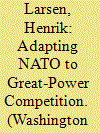

|
|
|
|
|
| Summary/Abstract |
Following Russia’s February 2022 invasion of Ukraine, NATO’s main challenge is to eliminate doubts about its strength and resolve to defend every inch of its territory, as stated in its recently published Strategic Concept, an authoritative document for the alliance’s strategic direction until 2030 (and beyond).Footnote1 By the Vilnius Summit in the summer of 2023, the alliance is set to complete the transition to a new NATO Force Model to deter Russian aggression. However, NATO’s adaptation to the military threat posed by Russia is complicated by the simultaneous need to factor in the rise of China. A rising China is stretching US military resources, and its technological clout creates vulnerabilities for a functioning defense alliance. These are vulnerabilities to which European NATO members must be especially attuned.
|
|
|
|
|
|
|
|
|
|
|
|
|
|
|
|
| 2 |
ID:
189731
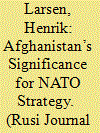

|
|
|
|
|
| Summary/Abstract |
NATO has reaffirmed crisis management as one of its ‘core tasks’, even as it strengthens collective defence amid Russia’s invasion of Ukraine, and specifically refers to the need to learn from Afghanistan. Henrik Larsen argues that NATO needs to face the uncomfortable realities that can explain the failure of its most ambitious and deadliest operation in its history. Given that the Afghanistan experience makes a strong case against crisis management, he argues that NATO should refine its definition: ‘crisis’ synonymous with the prevention of inter-state conflict rather than diffuse threats such as global terrorism; and ‘management’ synonymous with over-the-horizon rather than open-ended operations or the supply of weapons like the case of Ukraine.
|
|
|
|
|
|
|
|
|
|
|
|
|
|
|
|
| 3 |
ID:
089898
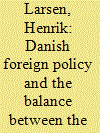

|
|
|
|
|
| Publication |
2009.
|
| Summary/Abstract |
In the international debate, it is often argued that Denmark, in its major foreign policy priorities, has sided with the United States (US) since the Cold War rather than with the European Union (EU) or its European partners. I examine whether this is correct, and if it is, why this is so, since 2001. I also ask whether a different theoretical approach, namely discourse analysis, would lead to findings different from those of the dominant approaches. I first present various ways of explaining why a country chooses the balance that it does between the EU and the US. One particular approach, post-structuralist discourse analysis, is applied. The balance between the EU and the US in the dominant Danish discourse is analysed. I outline the policy level and attempt to map where Danish policies are conducted with the EU and the US, respectively. I show that the EU is the most important partner across foreign policy areas since 2001, despite ad hoc foreign policy cooperation with the US, and that this is due to a dominant discourse articulating the EU as `our most important alliance'. However, the US is the most important partner on military security issues based on a discourse articulating cooperation with the US as a central part of Danish foreign policy identity and an `offensive foreign policy'.
|
|
|
|
|
|
|
|
|
|
|
|
|
|
|
|
| 4 |
ID:
177918
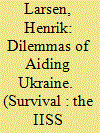

|
|
|
|
|
| Summary/Abstract |
Western benefactors must apply tougher conditionalities to encourage Ukraine’s policymakers to reform and to resist elite spoilers.
|
|
|
|
|
|
|
|
|
|
|
|
|
|
|
|
| 5 |
ID:
134256
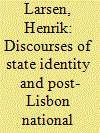

|
|
|
|
|
| Summary/Abstract |
The political system of the EU and its member states is frequently seen as post-Westphalian within constructivist-inspired research. This is based on the view that political authority and legitimacy are to be found both at the EU level and the national level with no clear borders between them. The question raised in this article is how the member states conceive of themselves as foreign policy actors in this situation where they are both politically embedded in EU foreign policy structures and, in most cases, formally able to act outside the EU structures in the field of foreign policy. The overall argument is that a pertinent answer to this question can be provided by looking at how (or whether) state identity is articulated in relation to the EU. The paper first presents theoretical considerations relating to discursive articulations of state identity in an EU context. The relevance of these discursive articulations is then illustrated through the empirical example of Danish articulations of actorness prior to and post Lisbon. It is shown that the articulation of national actorness in relation to the EU varied across the different areas of foreign policy before and after Lisbon. A research agenda that flows from these considerations is outlined.
|
|
|
|
|
|
|
|
|
|
|
|
|
|
|
|
| 6 |
ID:
091919
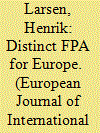

|
|
|
|
|
| Publication |
2009.
|
| Summary/Abstract |
In the existing literature, the need for a distinctive approach to the analysis of foreign policy in Europe is usually seen as a uniform requirement applying across policy areas. At the same time, the criteria for judging the need for a new approach are underspecified. The article puts forward the argument that the approach to analysis of the national foreign policies of EU member states ought to vary according to the policy area under study. On the basis of an empirical study of Danish foreign policy, the article presents a comprehensive framework for the analysis of national foreign policy in an EU context which takes account of differing issue areas. The framework includes three analytical lenses: traditional FPA, transformed FPA and postmodern FPA. These lenses are derived from the strength of the EU policy and the national understandings of agency in the area concerned
|
|
|
|
|
|
|
|
|
|
|
|
|
|
|
|
| 7 |
ID:
001412
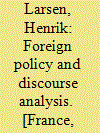

|
|
|
|
|
| Publication |
London, Routledge, 1997.
|
| Description |
xxv,243p.
|
| Standard Number |
0415159768
|
|
|
|
|
|
|
|
|
|
|
|
Copies: C:1/I:0,R:0,Q:0
Circulation
| Accession# | Call# | Current Location | Status | Policy | Location |
| 040960 | 327/LAR 040960 | Main | On Shelf | General | |
|
|
|
|
| 8 |
ID:
180515
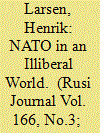

|
|
|
|
|
| Summary/Abstract |
Partnerships remain NATO’s only external policy instrument in an illiberal world. However, NATO needs to differentiate more clearly between its partners and intensify security cooperation with like-minded states to mitigate the threats posed by Russia and China. Henrik Larsen proposes the following differentiation: ‘Advanced Partners’ in Western Europe and the EU, stressing the benefits of their technological strengths and shared values to bolster joint resilience capacity; ‘Enhanced Partners’ in the Western Balkans and Eastern Europe, focusing on the need to improve governance and resilience vis-à-vis illiberal powers; and ‘Worldwide Partners’, prioritising both NATO’s southern periphery, to manage regional instability, and the Asia-Pacific, to counter threats posed by the rise of China. Partnership reform should accompany a reflection about the role of resilience in NATO’s security and defence portfolio.
|
|
|
|
|
|
|
|
|
|
|
|
|
|
|
|
| 9 |
ID:
138764


|
|
|
|
|
| Summary/Abstract |
This article attempts to demonstrate the importance of the discursive context for whether and, if so, how the European Union (EU) can exert normative power in different policy areas. Surprisingly, the concept of power has not been extensively discussed in the academic literature on Normative Power Europe, with the notable exceptions of Diez (2013); Keene (2012); Forsberg (2011) and Huelss (2011) (who also discuss the meaning of the ‘normative’). Focusing on power, the question asked in this article is how the discursive context of the politics of religion affects the EU’s ability to exert normative power in this area. The article examines the politics of religion by looking at the case of the debate about human rights versus religion in the United Nations Human Rights Council after the year 2000. The broader point addressed in the article is whether the EU can exert normative power regardless of the discursive context of the policy area concerned.
|
|
|
|
|
|
|
|
|
|
|
|
|
|
|
|
|
|
|
|
|